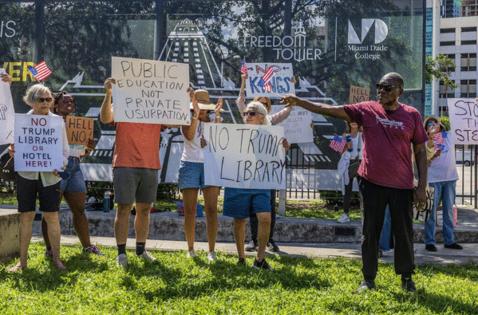Appellate Court rejects Florida attorney general's request in Trump library case
Published in News & Features
MIAMI — Florida Attorney General James Uthmeier has been handed his first loss in higher court since joining Miami Dade College’s defense in a lawsuit over whether the school’s Board of Trustees violated Florida’s Sunshine Law when it voted to give away land for Donald Trump’s presidential library.
Uthmeier asked Florida’s Third District Court of Appeal for a speedy decision on reversing a lower court judge’s ruling temporarily blocking the college from handing over the land while the case proceeds.
The appellate court, stacked with judges appointed by Ron DeSantis and Rick Scott, rejected his request for an expedited appeal Wednesday without further explanation.
An attorney for historian and activist Marvin Dunn — who is bringing the lawsuit against the College — said the ruling signals the higher court is open to the possibility that the college broke the law.
“If the court thought there was something wrong with this underlying decision that needed to be corrected immediately, it would have done that,” Dunn’s attorney Andres Rivero said. “I think that this is the court’s view that the process should proceed normally and so we will start to take depositions and find out what actually happened here.”
Uthmeier’s office did not respond to questions from the Miami Herald about the court’s denial of his request.
The underlying case is about whether Miami Dade College provided “reasonable notice” to the public under Florida’s Sunshine Law ahead of a Sept. 23 meeting where trustees voted to transfer land to the state, without specifying what plot of land they were voting on or the intended purpose beforehand. The college did not respond to requests from the Herald a day prior to the meeting about whether the land transfer was related to the presidential library.
The case could also have sweeping implications for the future of public transparency in the state, open government advocates have warned, particularly if a higher court agrees with Uthmeier that the Sunshine Law should be narrowly interpreted to mean government agencies only need to provide logistical – but not substantive – information ahead of public meetings.
The case represents the first major hurdle Trump’s high-rise presidential library plans have faced. One week after the college voted to transfer the land to a state board, the board, including Uthmeier, unanimously voted to transfer the land at no cost to Trump’s presidential library foundation. The only restriction on that deal is that construction begins within five years.
Uthmeier asked the higher court to skip oral arguments and make a speedy ruling to overturn the lower court’s block on transferring the land last week.
“Without an expedited appeal, that decision risks interfering in the State’s ‘absolute right’ to manage its ‘proprietary property,” Uthmeier wrote.
He also argued that a quick ruling from the higher court was necessary to provide “prompt clarity to public entities about their obligations under the Sunshine Act.”
Dunn’s attorneys responded in a written brief to the court arguing that there’s no need for an expedited ruling since the College could end the litigation at any time by holding a new publicly noticed meeting to vote on the land transfer again.
The case will continue to play out in Miami Dade Circuit Court in front of elected Judge Mavel Ruiz, who has already said that Dunn’s argument has “substantial likelihood of success on the merits.” The next hearing in the case is scheduled for Nov. 24.
There was another hurdle that threatened to stall the case earlier this week: Ruiz required Dunn pay a $150,000 bond to cover what the college says are potential losses it will incur by holding on to the land while the case proceeds.
Dunn raised more than $20,000 for the bond on the online fundraising platform GoFundMe and said he borrowed the rest to pay the bond in time to post the payment in time this week and keep the case alive.
“It’s worth it to me because, unless it’s very clear in the law and in the court what the Florida Sunshine Law really means, then it’s a worthless law in the books,” Dunn told the Herald. “It’s important to have that standard set for future cases, not just for this one, it makes it meaningful beyond just what happens in my case.”
©2025 Miami Herald. Visit at miamiherald.com. Distributed by Tribune Content Agency, LLC.







Comments